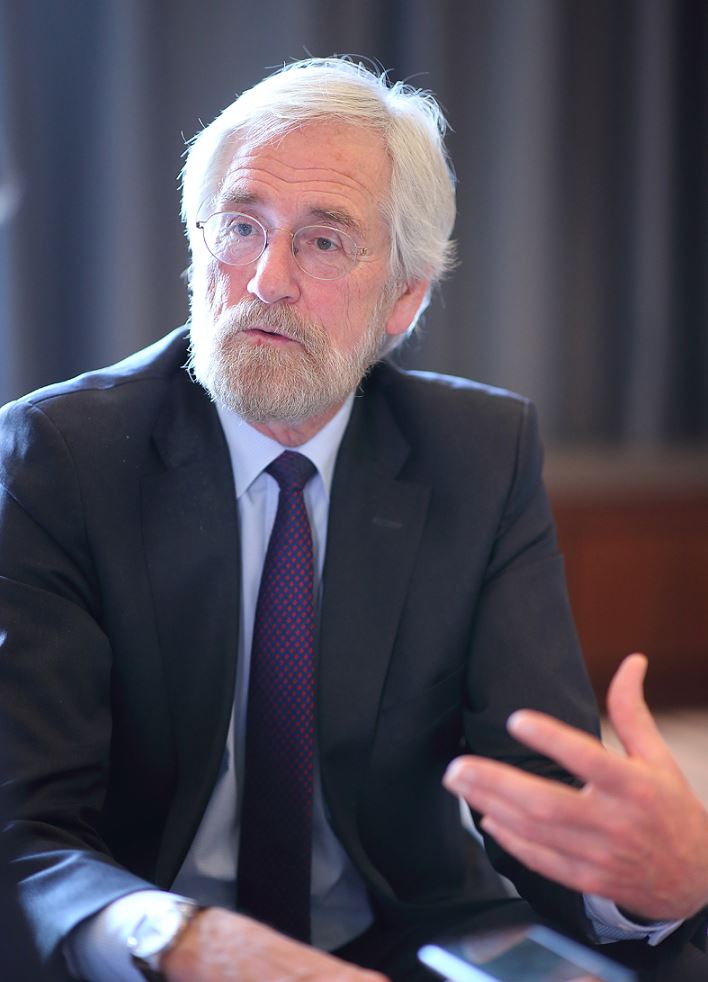Peter Praet: the institutional weaknesses in the euro area have to be urgently addressed
EnglishThe former chief economist and executive board member of the ECB told novekedes.hu that the Maastricht criteria are broadly useful but they cannot guarantee the sustainability of the monetary union. According to Peter Praet the importance of financial stability rules for the sustainability of the monetary union were underestimated from the beginning.
This year we celebrate the 20th anniversary of the common European currency. What are the most important objectives that have met the original intentions of the „founding fathers”?
I think what is remarkable is that the euro is very much supported by a large majority of the population. That is the case in old member states, even in Germany, where we have seen in the past years a lot of criticism with respect to monetary policy. Most people believe that euro is irreversible and no one seriously considers to restore the national currency.
So the main achievement is the high acceptance of the euro, which is notable after the sovereign debt and banking crisis. This being said, the institutional weaknesses in the euro area have to be urgently addressed.
The sustainable convergence is important not only to those countries that are likely to join the eurozone but also to the present euro area members, where we can observe a lot of divergences.
Some objectives have been partially met during these two decades. What are the main areas where the euro has not fulfilled its role?
Unfortunately the eurosystem experienced a very severe existential crisis. During that time some countries slipped into a deep recession and a significant adjustment process was needed. The importance of financial stability rules for the sustainability of the monetary union were underestimated from the beginning.
There was no single supervision for banks, there was no crisis mechanism for sovereign debt crisis. The crisis led to important institutional improvements, but they should have been done before and not just after the crisis.
The second problem is that the reforms that have been realized are not finalised and have to be complemented by others. Unfinish work poses a risk in itself for the euro area. I am referring here to the incomplete banking union and capital market union.
A third problem is that sometimes the euro is blamed as the main cause of underperformances in some countries. To take the example of Italy, productivity stopped to grow already in the mid 90’s, well before joining the euro. The introduction of the euro didn’t change Italy’s growth trajectory markedly.

You have been executive board member of the European Central Bank. In your view how can the ECB support growth in the eurozone?
What worries me is that in recent years one expects too much from the central bank. The ECB has a very clear mandate, which is price stability. To the extent the price stability is realized the central bank can contribute to other objectives, like growth and employment.
Good monetary policy supports growth by reducing uncertainty on future inflation, providing a solid nominal anchor, decreasing the probability of inflationary or deflationary shocks. However, the basic source of wealth creation is not the central bank.
The main responsibility for welfare is in the hands of national authorities. If a country wants to promote productivity, it must make efforts in the field of education, it must upscale the labor force and it will need a business friendly legal framework.
How can the ECB diminish the differences between the eurozone countries?
There is one monetary policy for the euro area. Real divergences across countries have to be tackled by other policies. But the European Central Bank must ensure the smooth transmission of its monetary policy in the different countries. This has been a major issue in the recent crisis years and has been addressed successfully by the ECB.
The central bank can influence lending conditions but usually its responsibility stops there. The rest depends on the structural reforms implemented by the member states.

What are the advantages and disadvantages that Central European countries - like Hungary - would experience if they joined the euro area?
The introduction of the euro is irreversible. Therefore countries must carefully assess the potential costs and benefits of joining the eurozone. It is also crucial that a potential member state should be able to meet the Maastricht criteria in a sustainable way.
Before entering the exchange rate mechanism and later the monetary union, a country must reinforce the cooperation with the Single Supervisory Mechanism (SSM), and must ensure that it has a sufficiently strong banking system. Every euro area and also non-euro area countries benefit from a stable eurozone.
In my opinion a candidate country must be well prepared, and enter the eurozone from a strong position, and not in the hope that the euro is going to solve a number of structural problems.
When the monetary union was created the hope was that member states would be “forced” to conduct structural reforms, improve their institutional environment. Unfortunately this has not always been the case.
Many economists think that the Maastricht rules should be updated and reviewed in order to face the challenges of the eurozone countries. Do you agree with some of the criticism?
The Maastricht criteria are broadly useful but they cannot guarantee the sustainability of the monetary union. I agree that some of the criticisms of the Maastricht criteria are justified. The classical convergence criteria need to be respected, but importantly you have to look at the other relevant factors, as well.
Good governance and institutions in a country, transparency, low corruption, an efficient labor market etc. The identification of macroeconomic imbalances goes much further than the classical Maastricht criteria and are extremely important for assessing sustainability.
Both euro area and non-euro area countries need to work continuously, in order to make their debt trajectory sustainable regardless the classical Maastricht criteria.
It is important to add that non member countries would like to see a better functioning monetary union before joining it. The efforts must be done from both sides. It is clear that if the eurozone doesn’t fix its problems other non-member states will suffer from spillover effects.
The main question regarding the rules is that they do not guarantee sustainability. While reforming the Maastricht criteria requires a Treaty change, bringing long term sustainability issues in the picture is of interest of all parties for the sake of the stability of the eurozone.
